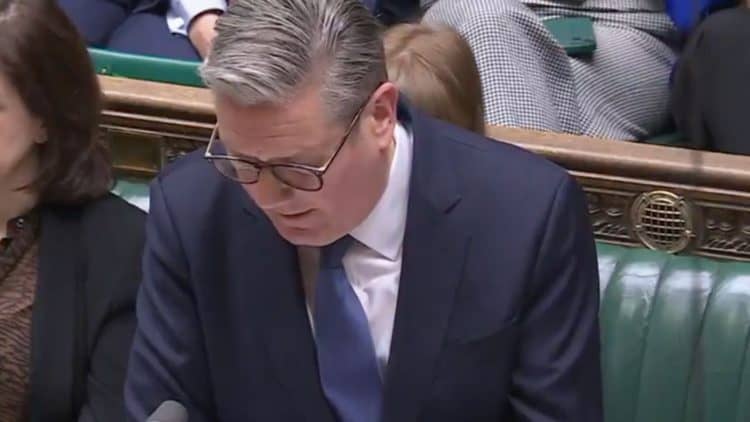US President Donald Trump has claimed that Sir Keir Starmer “was very happy” with Washington’s new 10 per cent tariff on UK goods, as Starmer warned of a “new economic era”.
“We have a very good dialogue. I think he was very happy about how we treated them with tariffs,” the US president told reporters on Air Force One, adding that he was open to negotiations if countries offer “something that is so phenomenal”.
Really happy?
On Times Radio this morning, the exchequer secretary to the Treasury James Murray was asked if he agreed with the president’s statement.
The Treasury minister replied: “We are disappointed at tariffs being imposed globally.
“We are in a better position than many other economies moving forward, because we’re in the lowest band of tariffs.
“But our goal is to get that economic deal. And as you know we have been negotiating intensely since the prime minister went to Washington earlier in the year, and those negotiations now continue at pace, because we know that getting that deal is in the best interest of the UK.”
However, Labour’s fiscal rules are “non-negotiable” and will not be changed because of the economic uncertainty caused by Donald Trump’s tariffs, a Treasury minister said.
James Murray said the Government would not reconsider its rules despite economists warning the tariffs could wipe out Rachel Reeves’s economic room for manoeuvre.
Business Secretary Jonathan Reynolds told MPs: “To enable the UK to have every option open to us in future, I am today launching a request for input on the implications for British businesses of possible retaliatory action. This is a formal step necessary for us to keep all options on the table.
“We will seek the views of UK stakeholders over four weeks until 1 May 2025 on products that could potentially be included in any UK tariff response. This exercise will also give businesses the chance to have their say and influence the design of any possible UK action.”
FTSE
After bleeding to its lowest level since mid-January on Thursday, the FTSE 100 then fell a further 0.64 per cent during Friday morning trading, as Asia-Pacific markets opened in the red for a second day – with Japan’s Nikkei falling 1.85 per cent and Australia’s S&P/ASX 200 index tumbling 2 per cent to an eight-month low.
That came after S&P 500 companies lost a combined $2.4 trillion in stock market value on Thursday in their biggest one-day loss since Covid sparked global lockdowns five years ago.
Related: Trump’s tariffs could undermine Brexit in Northern Ireland – here’s how







